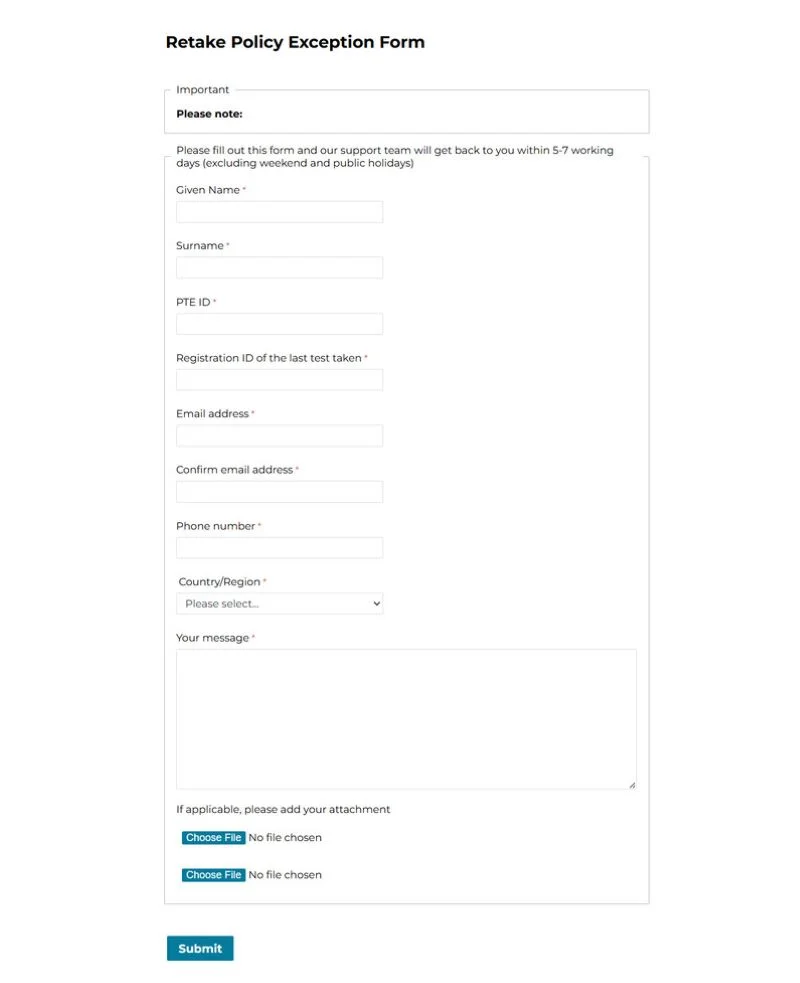How to Bounce Back After Failing the PTE Test the First Time
06 Nov 2025
After failing the PTE exam on your first attempt, you might feel disheartened and eventually start to feel lost as you are unsure of what went wrong. It’s completely normal to feel scared after such a setback, especially when facing the prospect of retaking the test. And in fact, getting back on the journey to retake the PTE can be intimidating. A drop in confidence is common at this stage, but with the right mindset and preparation, you can overcome it and move forward.
Therefore, as PTE experts, we would love to show you how to come back after failing the PTE test the first time. It’s an opportunity to hone your tactics, get beyond challenges, and end up winning with newfound vigor.
Keep scrolling to find out about our tips to improve your retake journey with confidence, and let success be your ultimate destination.
The PTE Retake Policy
First of all, don’t be afraid to get reevaluated if you have a gut feeling that your performance and efforts aren’t well-reflected in your score. Gladly, PTE has a fairly friendly stance in this matter.
Nevertheless, if a score review or score re-evaluation facility confirms that your performance is below par, it is time to retake the test. If you did not hit your aim in your first attempt, take time to analyze what went wrong before scheduling your next test.
When preparing for a retake of a test, bear the following in mind:
- Only when you have received the results of your previous test, may you schedule a new one.
- Only one exam can be scheduled at a time.
- You can schedule tests up to six months in advance.
- The test can be taken more than once every month. However, you have a 12-month window in which to take the test no more than 12 times. You could occasionally be given permission to retake the exam. You need to fill out the exemption form to request this.
Set a clear aim for your next attempt to guide your preparation and help you focus your efforts on hitting your target score.

Note: Don’t try to get around these restrictions by registering for a new account. Doing so potentially violates their malpractice policy and could cause your future test results to be delayed.
Assessing Your Previous Performance
If you didn’t achieve your desired PTE score on your first attempt, don’t worry this is your chance to learn and improve. The first step is to conduct a thorough self-check of your previous performance. Review your PTE test results and take note of your scores in each section. Identify the weak points where you struggled, whether it was in writing, speaking, listening, or reading.
Understanding where things went wrong is crucial for your next attempt. Seek expert advice from experienced instructors or trusted online resources to gain insights into your performance. They can help you analyze your results, highlight specific areas for improvement, and suggest targeted strategies to enhance your preparation.
By taking the time to assess your previous attempt, you can start fresh with a clear understanding of what you need to achieve. Create a focused study plan that addresses your weaknesses and builds on your strengths. This approach will not only improve your PTE score but also boost your confidence for your next test.
How to Rebound from Your First Failure
We are all susceptible to failure. Even the hardest-working PTE students might need to get ready for their first setback. It might occasionally feel like the end of your academic journey but it is merely a speed bump.
Thus, don’t lose your momentum over it. Instead, you should maintain a positive mindset and learn how to come back after failing the PTE test the first time. Continue your preparation and don’t let one failure stop your progress : keep practicing, reviewing your mistakes, and improving your study routine.
Here are some strategies to help you pick yourself up and get back on track.
Be Easy on Yourself
Have you ever experienced a moment in your life where you felt defeated and told yourself “I’m a loser!” after you failed at something that you thought you were good at? If yes, it is perfectly normal.
However, if you let that small voice of hopelessness get deep inside of your head, sooner or later you will get discouraged and decide to quit.
A loser is still better than a quitter. You may have lost a battle, but not a war. So, kicking yourself is not only helpless but also possibly causes you to give up.
Therefore, go easy on yourself if you don’t pass the PTE test the first time. Relax and remind yourself of what your ultimate goal is. And that is “passing the PTE test with a good score” and not “accomplishing that right the first time.”
Think of Your Past Successes
We frequently obsess over what we believe we are incapable of doing when we fail.
In these situations, it’s critical to remind yourself that you are a capable, wise, and valuable individual. Your shortcomings do not define who you are.
Consider your past achievements, both academic and otherwise. Simply glancing at your degrees or certifications, if you have any, could be a potent reminder that you are capable.
Rebuild Your Confidence
Even when someone is well-prepared for a test, their dread of failing comes out loud and clear. Particularly when you are taking the test for the second time, it gets tricky.
Although your confidence is lowered by the prior failure, you must keep in mind that failure is the stepping stone to success.
Hence, do not be under-confident or get discouraged! Believing that you will pass the test this time is the best preparation for you when learning how to come back after failing the PTE test the first time.
Just look at the bright side! You are granted this second chance to enhance your scores by avoiding all of the mistakes you made in the first one.
That means you will only get better and better. So, go ahead with your chin up.

Start Fresh
It won’t be sufficient to just address the trouble spots. Start preparing as thoroughly and excessively as though you were about to take the test for the first time. Consider all the things that prevented you from giving it your all the last time.
Then, remove those distractions and concentrate only on your preparation.
What’s done is done. You had better take advantage of this second opportunity to raise your score. So, shake off all the disappointments and be ready to get off to a good start.
Avoiding Common Mistakes
Achieving a high PTE score isn’t just about hard work it’s also about working smart and avoiding common mistakes that can hold you back. One of the most frequent pitfalls in the PTE exam is poor time management, which can leave you rushing through questions or leaving answers incomplete.
Another common issue is limited vocabulary, which can make it difficult to express your ideas clearly in the Writing and Speaking sections.
To overcome these challenges, make regular use of practice tests and mock tests. These resources will help you get comfortable with the exam format and improve your pacing.
Incorporate language learning into your daily routine by listening to English radio shows, watching videos, and recording yourself speaking. This will help you expand your vocabulary and enhance your listening and speaking skills.
By being mindful of these common mistakes and actively working to overcome them, you’ll be better prepared to achieve success in your next PTE exam.
Remember, every practice session is an opportunity to improve and get closer to your goal.
Managing Expectations for Your Next Attempt
As you prepare for your next PTE exam attempt, it’s important to manage your expectations and set realistic, achievable goals. Instead of aiming for a perfect score right away, focus on steady improvement identify your weaknesses and work on turning them into strengths.
Break your preparation into manageable sections, and set clear targets for each part of the test.
Improvement takes time, so be patient with yourself and celebrate small victories along the way. Use the eight mantras for PTE success and seek expert advice to guide your study plan.
Remember, every attempt is a valuable learning experience, and even setbacks can teach you important lessons that will help you improve.
Stay motivated, keep your eyes on your goals, and don’t let previous failures discourage you.
With the right preparation, a positive mindset, and a clear plan, you’ll be well on your way to achieving your desired PTE score and succeeding in the exam.
Get Ready to Conquer the PTE Exam on Your Second Attempt
After failing at something, it is pretty easy to get into a passive, self-pitying mindset. You can climb out of that hole by assigning yourself constructive tasks that give you a sense of control over your life.
Building your knowledge of the PTE exam format, question types, and identifying your weak points is crucial for improvement.
Thus, when we are done with the blame game, it is time to take a much more active approach to determining how to come back after failing the PTE test the first time.
Seeking assistance from experts or tutors can also provide valuable support and guidance as you prepare for your next attempt.
Get Expert Help
After you fail the PTE exam, you definitely feel sad and even worse, lost! You will be wondering where things have gone wrong. Eventually, you will get strayed in the maze of questions and doubts. The best way to get out is to get help from the experts.
We all need help sometimes and finding it from the right person is of the utmost importance. That’s why we recommend you go to experts, sit with them and go through an in-depth analysis of your score. It is important to openly discuss your score report and weaknesses with the expert, as this discussion helps develop a targeted strategy for improvement. They will help you identify the loopholes quickly.
Like our experts at the PTE Magic, we welcome all the students whether you are the first-time test taker or you are on your second try. We would love to spend time with each candidate to help find the right solution.
Once you have identified the weak areas, you can start working on them alone or with the expert help on how to come back after failing the PTE test the first time.

Talk to Successful Candidates
Speak with some candidates who have already passed the exam, especially those who have scored highly, and get their opinion on the materials you should focus on. Moreover, learning about their test-taking techniques and study habits may be beneficial. They might have a strategy that works for them and could work wonderfully for you as well.
Upgrade Yourself
You must take an entirely new approach if you want your PTE exam results to be different this time. That means you need to change the ways you learn.
Now you need to work smarter. Therefore, make a personal inventory of your current study habits, determine which of the Old Tactics are no longer appropriate, and discard them. After that, you can adopt fresh study techniques that you have picked up from the other successful candidates. Incorporate new words, synonyms, and phrases into your study routine to enhance your vocabulary, improve clarity, and make your communication more effective for the PTE exam.
Besides, you can put in a little more effort than you did before by bringing the English language in all contexts not just for studying. Make it a habit, not just a task!
Find the Right Study Materials
The secret to passing the PTE exam is always having trustworthy study materials on hand. You must locate updated and appropriate resources to help you advance this time when retaking the PTE exam. That does not, however, imply that you have to throw away the old books.
Keep those that helped you the most last time and combine them with the new ones to give you the playbook for the next fight. Yet, the ultimate point is that you need authentic and high-quality study materials you can find on the PTE’s official website or from your instructor’s sources. You should also download practice tests and sample questions from official sources to ensure you are preparing with the most relevant content. Additionally, record audio materials such as radio shows to practice and improve your listening skills for the PTE exam.

Conclusion
Although receiving a lower-than-expected PTE result is heartbreaking, it is not the end of the world. The exam retake policy allows you to retake the examination whenever you choose.
Yet, no one wants to retake the test many times. Therefore, after failing the first time, the second time of taking the test would be undoubtedly significant. That means more pressure unless you follow our tips above to boost your preparation, access useful resources, and regain your confidence.
Overall, focused effort, professional guidance, and a novel strategy will be your guide on how to come back after failing the PTE test the first time and get your desired score. Embrace this retake as an opportunity to show off your development and perseverance, which will ultimately help you pass the PTE exam.
FAQs
Is it possible to retake individual PTE sections?
No, you cannot choose to retake just specific sections of the PTE; you must retake the entire exam.
Will my current test results be impacted by my previous PTE scores?
Your current test results will not be influenced by your previous PTE scores. Only the most recent score is taken into account, and each attempt is evaluated separately.
What is the maximum number of times I can take the PTE exam?
The PTE exam has no defined limit on the number of times a student may take the test. However, you can only take it a maximum of12 times within a 12 month period and each exam should be taken five days apart.
You can ask for an exception if you must take the test more than twelve times during this time.
Can two PTE scores be combined?
PTE results from multiple test sittings cannot be combined for the majority of immigration and educational purposes since a single test result that satisfies all standards is required.
However, you can combine the results of two tests in some circumstances, such as AHPRA nursing registration in Australia, as long as certain requirements are fulfilled, such as a minimum score in each skill and a maximum interval between examinations.
How long is the PTE Score Validity?
For information on how to check your PTE exam results, see this comprehensive guide on checking PTE exam scores.
After the exam date, your PTE score report will be valid for 2 years. However, scores up to 3 years old may be accepted for some particular Australian visa categories, such as Permanent Residency (PR).
Moni Vuong
PTE Magic
My name is Moni, and I am a seasoned PTE teacher with over 6 years of experience. I have helped thousands of students overcome their struggles and achieve their desired scores. My passion for teaching and dedication to my student’s success drives me to continually improve my teaching methods and provide the best possible support. Join me on this journey toward PTE success!
Frequently Asked Questions
What’s the difference between PTE Academic and PTE Core?
What is PTE Exam Structure and Duration?
How is PTE exam scored?
What tasks are included in PTE Academic?
What tasks are included in PTE Core?
How long is the score valid?
Where can I book PTE Academic and PTE Core exams?
How much does the PTE exam cost?
How can I prepare for the PTE Exam?
Subscribe to our newsletter.
PTE Magic Practice Platform is an AI-powered PTE test prep platform that helps you achieve your desired score with exam-like questions, instant AI scoring, and personalised feedback. Achieve your best PTE score with targeted practice and proven strategies.


